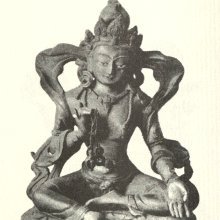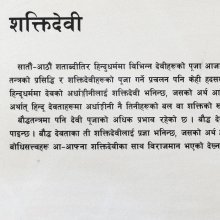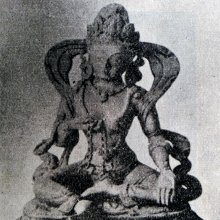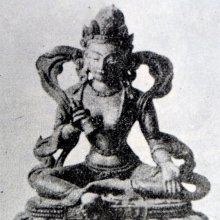Artha: 36 definitions
Introduction:
Artha means something in Buddhism, Pali, Hinduism, Sanskrit, Jainism, Prakrit, the history of ancient India, Marathi, Hindi. If you want to know the exact meaning, history, etymology or English translation of this term then check out the descriptions on this page. Add your comment or reference to a book if you want to contribute to this summary article.
Images (photo gallery)
In Hinduism
Dharmashastra (religious law)
Source: Wisdom Library: Dharma-śāstraArtha (अर्थ) refers to the “treasury”. It is used throughout Dharmaśāstra literature such as the Manusmṛti and the Baudhāyana-dharmasūtra.
Source: Google Books: Manusmṛti with the ManubhāṣyaThe term Artha (अर्थ, “purpose”) stands for what is helpful; the meaning therefore is that what is mentioned here is the means for accomplishing what is helpful for man; (See the Manubhāṣya verse 7.100-101)

Dharmashastra (धर्मशास्त्र, dharmaśāstra) contains the instructions (shastra) regarding religious conduct of livelihood (dharma), ceremonies, jurisprudence (study of law) and more. It is categorized as smriti, an important and authoritative selection of books dealing with the Hindu lifestyle.
Purana and Itihasa (epic history)
Source: Cologne Digital Sanskrit Dictionaries: The Purana IndexArtha (अर्थ).—Born of dharma and buddhi1 Its ills;2 not to be earned by a king by illegitimate means and not to abuse it by giving it to undesirables.3
- 1) Bhāgavata-purāṇa IV. 1. 51; I. 2. 9.
- 2) Bhāgavata-purāṇa XI. 23. 17-21.
- 3) Matsya-purāṇa 220. 11; Vāyu-purāṇa 23. 81; 61. 130.

The Purana (पुराण, purāṇas) refers to Sanskrit literature preserving ancient India’s vast cultural history, including historical legends, religious ceremonies, various arts and sciences. The eighteen mahapuranas total over 400,000 shlokas (metrical couplets) and date to at least several centuries BCE.
Mīmāṃsā (school of philosophy)
Source: Srimatham: Mīmāṃsa: The Study of Hindu ExegesisArtha (अर्थ, “meaning”) is the content carried by the words exchanged by people when communicating through language. In other words the communication of meaning is the purpose and function of language. A sentence therefore should convey an idea from one person to another. Meanings may take many forms, such as evoking a certain abstract idea, conveying an emotion, or denoting a certain real-world entity.

Mimamsa (मीमांसा, mīmāṃsā) refers to one of the six orthodox Hindu schools of philosophy, emphasizing the nature of dharma and the philosophy of language. The literature in this school is also known for its in-depth study of ritual actions and social duties.
Vastushastra (architecture)
Source: Wisdom Library: Vāstu-śāstraArtha (अर्थ, “material goods”) refers to one of the ten effects of vyaya (“loss”), according to the Mānasāra. Vyaya is the second of the āyādiṣaḍvarga, or “six principles” that constitute the “horoscope” of an architectural or iconographic object. Their application is intended to “verify” the measurements of the architectural and iconographic object against the dictates of astrology that lay out the conditions of auspiciousness.
The particular vyaya (e.g., artha) of all architectural and iconographic objects (settlement, building, image) must be calculated and ascertained. This process is based on the principle of the remainder. An arithmetical formula to be used in each case is stipulated, which engages one of the basic dimensions of the object (breadth, length, or perimeter/circumference). Like in the case of the fruits of āya, all ten effects of vyaya must be considered as auspicious.

Vastushastra (वास्तुशास्त्र, vāstuśāstra) refers to the ancient Indian science (shastra) of architecture (vastu), dealing with topics such architecture, sculpture, town-building, fort building and various other constructions. Vastu also deals with the philosophy of the architectural relation with the cosmic universe.
Vyakarana (Sanskrit grammar)
Source: Wikisource: A dictionary of Sanskrit grammarArtha (अर्थ).—(I) lit.signification,conveyed sense or object. The sense is sometimes looked upon as a determinant of the foot of a verse: cf. प्रायोर्थो वृत्तमित्येते पादज्ञानस्य हेतवः (prāyortho vṛttamityete pādajñānasya hetavaḥ) R. Pr. XVII 16. It is generally looked upon as the determinant of a word (पद (pada)). A unit or element of a word which is possessed of an independent sense is looked upon as a Pada in the old Grammar treatises; cf. अर्थः पदमिति ऐन्द्रे (arthaḥ padamiti aindre); cf. also अर्थः पदम् (arthaḥ padam) V. Pr. III.2, explained by उव्वट (uvvaṭa) as अर्थाभिधायि पदम् । पद्यते गम्यते ज्ञायते (arthābhidhāyi padam | padyate gamyate jñāyate)Sर्थो-नेनेति पदम् । (rtho-neneti padam |) There is no difference of opinion regarding the fact that, out of the four standard kinds of words नाम, आख्यात, उपसर्ग (nāma, ākhyāta, upasarga) and निपात (nipāta), the first two kinds नाम (nāma) and आख्यात (ākhyāta) do possess an independent sense of their own. Regarding possession of sense and the manner in which the sense is conveyed, by the other two viz. the Upasargas (prepositions) and Nipātas (particles) there is a striking difference of opinion among scholars of grammar. Although Pāṇini has given the actual designation पद (pada) to words ending with either the case or the conjugational affixes, he has looked upon the different units or elements of a Pada such as the base, the affix, the augment and the like as possessed of individually separate senses. There is practically nothing in Pāṇini's sūtras to prove that Nipātas and Upasargas do not possess an independent sense. Re: Nipātas, the rule चादयोऽसत्वे (cādayo'satve), which means that च (ca) and other indeclinables are called Nipātas when they do not mean सत्त्व (sattva), presents a riddle as to the meaning which च (ca) and the like should convey if they do not mean सत्त्व (sattva) or द्रव्य (dravya) i.e. a substance. The Nipātas cannot mean भाव (bhāva) or verbal activity and if they do not mean सत्व (satva) or द्रव्य (dravya), too, they will have to be called अनर्थक (anarthaka) (absolutely meaningless) and in that case they would not be termed Prātipadika, and no caseaffix would be applied to them. To avoid this difficulty, the Vārtikakāra had to make an effort and he wrote a Vārtika निपातस्य अनर्थकस्य प्रातिपदिकत्वम् । (nipātasya anarthakasya prātipadikatvam |) P. I.2.45 Vār. 12. As a matter of fact the Nipātas च, वा (ca, vā) and others do possess a sense as shown by their presence and absence (अन्वय (anvaya) and व्यतिरेक (vyatireka)). The sense, however, is conveyed rather in a different manner as the word समूह (samūha), or समुदाय (samudāya), which is the meaning conveyed by च (ca) in रामः कृष्णश्च (rāmaḥ kṛṣṇaśca), cannot be substituted for च (ca) as its Synonym in the sentence रामः कुष्णश्च (rāmaḥ kuṣṇaśca). Looking to the different ways in which their sense is conveyed by nouns and verbs on the one hand, and by affixes, prepositions and indeclinables on the other hand, Bhartṛhari, possibly following Yāska and Vyāḍi, has developed the theory of द्योतकत्व (dyotakatva) as contrasted with वाचकत्व (vācakatva) and laid down the dictum that indeclinables, affixes and prepositions (उपसर्ग (upasarga)s) do not directly convey any specific sense as their own, but they are mere signs to show some specific property or excellence of the sense conveyed by the word to which they are attached; cf. also the statement 'न निर्बद्धा उपसर्गा अर्थान्निराहुरिति शाकटायनः नामाख्यातयोस्तु कर्मोपसंयेगद्योतका भवन्ति । (na nirbaddhā upasargā arthānnirāhuriti śākaṭāyanaḥ nāmākhyātayostu karmopasaṃyegadyotakā bhavanti |) Nir 1.3. The Grammarians, just like the rhetoricians have stated hat the connection between words and their senses is a permanent one (नित्य (nitya)), the only difference in their views being that the rhetoricians state that words are related; no doubt permanently, to their sense by means of संकेत (saṃketa) or convention which solely depends on the will of God, while the Grammarians say that the expression of sense is only a natural function of words; cf. 'अभिधानं पुनः स्वाभाविकम् (abhidhānaṃ punaḥ svābhāvikam)' Vārttika No.33. on P. I.2.64. For द्योतकत्व (dyotakatva) see Vākyapadīya of Bhartṛhari II. 165-206.
--- OR ---
Ārtha (आर्थ).—Resultant from sense; made up of sense; अर्थस्य अयम् आर्थ (arthasya ayam ārtha); cf तदा-दितदन्तत्वमार्थसमाजग्रस्तम् (tadā-ditadantatvamārthasamājagrastam) Par. Śek. on Pari.37.

Vyakarana (व्याकरण, vyākaraṇa) refers to Sanskrit grammar and represents one of the six additional sciences (vedanga) to be studied along with the Vedas. Vyakarana concerns itself with the rules of Sanskrit grammar and linguistic analysis in order to establish the correct context of words and sentences.
Shaivism (Shaiva philosophy)
Source: Shodhganga: Mantra-sādhana: Chapter One of the KakṣapuṭatantraArtha (अर्थ, “wealth”) is accomplished by performing mantrasādhana (preparatory procedures) beginning with japamālā using a rosary bead made of lotus seed beads or conch shell beads, according to the Kakṣapuṭatantra verse 1.43. Accordingly, “for the accomplishment of all kinds of kāma (love), one should recite a mantra using a rosary made of rudrākṣa beads. For the accomplishment of dharma (virtue), artha (wealth), kāma (love), and mokṣa (liberation), one should recite a mantra using a rosary made of lotus seed beads”.
According to verse 1.47, “to achieve artha (wealth), a rosary should be made from conch shell beads. To accomplish the nidhāna (treasure) and Yakṣiṇī ritual, the rosary should be strung with a white thread”

Shaiva (शैव, śaiva) or Shaivism (śaivism) represents a tradition of Hinduism worshiping Shiva as the supreme being. Closely related to Shaktism, Shaiva literature includes a range of scriptures, including Tantras, while the root of this tradition may be traced back to the ancient Vedas.
Nyaya (school of philosophy)
Source: Shodhganga: A study of Nyāya-vaiśeṣika categoriesArtha (अर्थ, “senses”) refers to the “object of senses” and represents one of the twelve prameya (“objects of valid knowledge) according to the first chapter of Gautama’s Nyāyasūtra (2nd century CE). Prameya in turn represents the second of the sixteen padārthas (“categories”). Accordingly, “arthas are smell, taste, colour, touch and sound. These are the qualities of the earth”.

Nyaya (न्याय, nyaya) refers to a school of Hindu philosophy (astika), drawing its subject-matter from the Upanishads. The Nyaya philosophy is known for its theories on logic, methodology and epistemology, however, it is closely related with Vaisheshika in terms of metaphysics.
Vaishnavism (Vaishava dharma)
Source: Pure Bhakti: Bhagavad-gita (4th edition)Artha (अर्थ) refers to “wealth, the second material goal of human life (See dharma, kāma and mokṣa)”. (cf. Glossary page from Śrīmad-Bhagavad-Gītā).
Source: Pure Bhakti: Bhajana-rahasya - 2nd EditionArtha (अर्थ) refers to:—Acquisition of wealth, economic development; one of the four goals of human life (puruṣārthas). (cf. Glossary page from Bhajana-Rahasya).
Source: Pure Bhakti: Brhad BhagavatamrtamArtha (अर्थ) refers to:—Acquisition of wealth; economic development; one of the four goals of human life. (cf. Glossary page from Śrī Bṛhad-bhāgavatāmṛta).

Vaishnava (वैष्णव, vaiṣṇava) or vaishnavism (vaiṣṇavism) represents a tradition of Hinduism worshipping Vishnu as the supreme Lord. Similar to the Shaktism and Shaivism traditions, Vaishnavism also developed as an individual movement, famous for its exposition of the dashavatara (‘ten avatars of Vishnu’).
Ayurveda (science of life)
Source: gurumukhi.ru: Ayurveda glossary of terms1) Artha (अर्थ):—Objects of sensory perception
2) [arthaḥ] ''(1) Heart a hollow muscular contractile organ, the centre of circulatory system. ''

Āyurveda (आयुर्वेद, ayurveda) is a branch of Indian science dealing with medicine, herbalism, taxology, anatomy, surgery, alchemy and related topics. Traditional practice of Āyurveda in ancient India dates back to at least the first millenium BC. Literature is commonly written in Sanskrit using various poetic metres.
Jyotisha (astronomy and astrology)
Source: Wisdom Library: Brihat Samhita by VarahamihiraArtha (अर्थ) refers to “wealth”, according to the Bṛhatsaṃhitā (chapter 15) (“On the nakṣatras—‘asterisms’”), an encyclopedic Sanskrit work written by Varāhamihira mainly focusing on the science of ancient Indian astronomy astronomy (Jyotiṣa).—Accordingly, “Those who are born on the lunar day of Punarvasu will be noted for truthfulness, generosity, cleanliness, respectable descent, personal beauty, sense, fame and wealth (artha); they will also be merchants, dealing in excellent articles, will be fond of service and will delight in the company of painters and sculptors. [...]”.

Jyotisha (ज्योतिष, jyotiṣa or jyotish) refers to ‘astronomy’ or “Vedic astrology” and represents the fifth of the six Vedangas (additional sciences to be studied along with the Vedas). Jyotisha concerns itself with the study and prediction of the movements of celestial bodies, in order to calculate the auspicious time for rituals and ceremonies.
Ganitashastra (Mathematics and Algebra)
Source: archive.org: Hindu MathematicsArtha (अर्थ) represents the number 5 (five) in the “word-numeral system” (bhūtasaṃkhyā), which was used in Sanskrit texts dealing with astronomy, mathematics, metrics, as well as in the dates of inscriptions and manuscripts in ancient Indian literature.—A system of expressing numbers by means of words arranged as in the place-value notation was developed and perfected in India in the early centuries of the Christian era. In this system the numerals [e.g., 5—artha] are expressed by names of things, beings or concepts, which, naturally or in accordance with the teaching of the Śāstras, connote numbers.

Ganitashastra (शिल्पशास्त्र, gaṇitaśāstra) refers to the ancient Indian science of mathematics, algebra, number theory, arithmetic, etc. Closely allied with astronomy, both were commonly taught and studied in universities, even since the 1st millennium BCE. Ganita-shastra also includes ritualistic math-books such as the Shulba-sutras.
Sports, Arts and Entertainment (wordly enjoyments)
Source: archive.org: Syainika Sastra of Rudradeva with English Translation (art)Artha (अर्थ) refers to “wealth” (which is obtaine by virtue), according to the Śyainika-śāstra: a Sanskrit treatise dealing with the divisions and benefits of Hunting and Hawking, written by Rājā Rudradeva (or Candradeva) in possibly the 13th century.—Accordingly, “[...] It has been said that there are eighteen addictions. These are the outcome of the desire for earthly enjovments. [...] Wise men speak of that wife as a wife who has auspicious marks and who knows the fine arts, who is clever, who is loved by her husband, and who is young and modest. [...] Wealth (artha) is obtained by virtue; from wealth emanate desires, and the fulfilment of all desires can be obtained by means of a good wife alone and of nobody else. Therefore, a loving wife is the best fruit of the tree of virtue. [...]”.

This section covers the skills and profiencies of the Kalas (“performing arts”) and Shastras (“sciences”) involving ancient Indian traditions of sports, games, arts, entertainment, love-making and other means of wordly enjoyments. Traditionally these topics were dealt with in Sanskrit treatises explaing the philosophy and the justification of enjoying the pleasures of the senses.
General definition (in Hinduism)
Source: WikiPedia: HinduismArtha (अर्थ): Wealth, one of the objects of human life, the others being Dharma, (righteousness), Kama (satisfaction of desires), Moksha (spiritual salvation).
In Buddhism
Tibetan Buddhism (Vajrayana or tantric Buddhism)
Source: archive.org: The Indian Buddhist IconographyArtha (अर्थ, “analysis”) or Arthapratisaṃvit refers to one of four Pratisaṃvit Goddesses, as commonly depicted in Buddhist Iconography, and mentioned in the 11th-century Niṣpannayogāvalī of Mahāpaṇḍita Abhayākara.—Her Colour is green; her Symbol is the noose; she has two arms.
Artha is described in the Niṣpannayogāvalī (dharmadhātuvāgīśvara-maṇḍala) as follows:—
“In the South, there is Artha-Pratisaṃvit of the colour of an emerald and holding in her two hands the jewel and the noose”.
[A statuette of this obscure deity is found in the Chinese collection.]

Tibetan Buddhism includes schools such as Nyingma, Kadampa, Kagyu and Gelug. Their primary canon of literature is divided in two broad categories: The Kangyur, which consists of Buddha’s words, and the Tengyur, which includes commentaries from various sources. Esotericism and tantra techniques (vajrayāna) are collected indepently.
Mahayana (major branch of Buddhism)
Source: academia.edu: A Study and Translation of the GaganagañjaparipṛcchāArtha (अर्थ) refers to “(the imperishable) knowledge of the meaning”, according to the Gaganagañjaparipṛcchā: the eighth chapter of the Mahāsaṃnipāta (a collection of Mahāyāna Buddhist Sūtras).—Accordingly as The Lord said: “O Śāriputra, in the buddha-field of the Tathāgata Ekaratnavyūha, there is a Bodhisattva, the great being Gaganagañja who is resplendent by the splendor of merit (puṇya-tejas), [...] who is purified in the realm of five eyes adorned with the [divine] sight (cakṣus), is endowed with the essence of understanding of all meaning with sound as adorned with the [divine] hearing, teaches the imperishable knowledge of the meaning (akṣaya-artha), dharmas, interpretation, and eloquence as adorned with special knowledge (pratisaṃvid), [...]”.

Mahayana (महायान, mahāyāna) is a major branch of Buddhism focusing on the path of a Bodhisattva (spiritual aspirants/ enlightened beings). Extant literature is vast and primarely composed in the Sanskrit language. There are many sūtras of which some of the earliest are the various Prajñāpāramitā sūtras.
General definition (in Buddhism)
Source: Wisdom Library: Dharma-samgrahaArtha (अर्थ, “meaning”) or Arthapratisaṃvid refers to one of the “four analytical knowledges” (pratisaṃvid) as defined in the Dharma-saṃgraha (section 51). The Dharma-samgraha (Dharmasangraha) is an extensive glossary of Buddhist technical terms in Sanskrit (e.g., artha). The work is attributed to Nagarjuna who lived around the 2nd century A.D.
In Jainism
General definition (in Jainism)
Source: Encyclopedia of Jainism: Tattvartha Sutra1) Artha (अर्थ, “substance”).—according to the 2nd-century Tattvārthasūtra 1.2, “Belief in substances (artha) and their modes as they are is right faith”. What is the meaning of artha? The conclusion and ascertainment about an entity (existent) is called artha.
2) Artha (अर्थ, “entity”).—What is the meaning of object (of knowledge) or entity (artha)? An entity or the object of knowledge is called artha. In the context of mind-based knowledge it implies the object which continues to be the object in all four stages of mind based knowledge. However in the context of sensation /awareness only, arthāvagraha is known as object-perception / awareness.

Jainism is an Indian religion of Dharma whose doctrine revolves around harmlessness (ahimsa) towards every living being. The two major branches (Digambara and Svetambara) of Jainism stimulate self-control (or, shramana, ‘self-reliance’) and spiritual development through a path of peace for the soul to progess to the ultimate goal.
India history and geography
Source: Cologne Digital Sanskrit Dictionaries: Indian Epigraphical GlossaryArtha.—(IE 7-1-2), ‘five’, (CII 1), a cause or matter. (CII 1), business. Note: artha is defined in the “Indian epigraphical glossary” as it can be found on ancient inscriptions commonly written in Sanskrit, Prakrit or Dravidian languages.

The history of India traces the identification of countries, villages, towns and other regions of India, as well as mythology, zoology, royal dynasties, rulers, tribes, local festivities and traditions and regional languages. Ancient India enjoyed religious freedom and encourages the path of Dharma, a concept common to Buddhism, Hinduism, and Jainism.
Languages of India and abroad
Marathi-English dictionary
Source: DDSA: The Molesworth Marathi and English Dictionaryartha (अर्थ).—m (S) Meaning, signification, sense, import, interpretation. 2 Meaning, intent, aim; matter purposed or proposed. 3 Substance, wealth, property. 4 A thing or matter to be attained or accomplished, an object. Ex. dharma artha kāma āṇi mōkṣa hē puruṣācē a0; Sansk. adage artha vā sādhayēta dēhaṃ vā pātayēt Success or death; my object accomplished or my life sacrificed. 5 One of the four grand objects of the human affections and faculties, viz. the pleasures conferred by fame, power, and riches. See severally dharma, artha, kāma, & mōkṣa. 6 A material substance; a created thing; any entity or object of sense: also an existence or relation in the widest sense; any object of the exercise of the mental faculties. 7 Fruit, product, consequence. 8 Desiring, desire, seeking. 9 Substance, strength, goodness, virtue. Ex. hyā śētānta ātāṃ kāṃhīṃ a0 nāhīṃ 10 artha is constantly occurring in learned discourse in the compounds lakṣyārtha Indicated, implied, or tacitlyinculcated sense; vācyārtha Declared or expressed sense; vyaṅgyārtha Insinuated or covertly-intimated sense. 11 In comp. For the purpose or sake of; in order to. Ex. śītanivāraṇārtha For the purpose of warding off the cold; adhyayanārtha In order to study; udarapōṣaṇārtha, dēvatārcanārtha, dānārtha, grahaṇārtha, gamanārtha, kathanārtha &c. 12 The learner must prepare himself to meet with some lax uses of this word: as jyā arthīṃ tumhī māgatāṃ tyā arthīṃ dilhēṃ pāhijē Since you ask for it, so we must give it to you. kōṇatyāhī arthānēṃ tumacēṃ vhāvēṃ In some way or other; whatever be the state of the case. 13 In law. A suit or case; an action. 14 artha answers closely to the word MATTER as bearing the wide sense of Thing to be done, or uttered, or understood, believed, thought &c. Ex. vālhā jāhālā sadradita || mhaṇēṃ kaisā artha karūṃ ātāṃ || Also as per the common asā artha nāhīṃ This is not the thing--the matter--(the thing said, intended, actual, come about &c.) 15 Regard or care for; sense of need of or interest in. Ex. sarvāṃsa sarvāñcā artha asāvā. arthācē tukaḍē bhāgavatācyā cindhyā Used of strained and wild exposition or interpretation. arthālā maraṇēṃ To be extravagantly eager in pursuit of one's own interest.
--- OR ---
ārtha (आर्थ) [or आर्थिक, ārthika].—a S Relating to artha the matter or subject; belonging to the sense or meaning;--as disting. from śābda Relating to words or style. 2 Implied, involved.
--- OR ---
artha (अर्थ).—. Add:--16 In modern Maraṭhi grammar. Mood. See saṅkētārtha, vidhyartha or ājñārtha, svārtha, śakyārtha.
Source: DDSA: The Aryabhusan school dictionary, Marathi-Englishartha (अर्थ).—m Meaning, signification, sense, import. Intent, aim, matter purposed or proposed. Substance, wealth. An object. Substance, strength, good- ness, virtue. Ex. hyā śētānta ātāṃ kāṃhīṃ artha nāhīṃ. In comp. For the purpose or sake of, in order to. jyā arthī-tyā arthī Since- So. svārtha Self-interest. Selfishness.
--- OR ---
ārtha (आर्थ) [or ārthika, or आर्थिक].—a Relating to the subject or sense or meaning. Implied.
Marathi is an Indo-European language having over 70 million native speakers people in (predominantly) Maharashtra India. Marathi, like many other Indo-Aryan languages, evolved from early forms of Prakrit, which itself is a subset of Sanskrit, one of the most ancient languages of the world.
Sanskrit dictionary
Source: DDSA: The practical Sanskrit-English dictionaryArtha (अर्थ).—[In some of its senses from arth; in others from ṛ-than Uṇādi-sūtra 2.4; arthate hyasau arthibhiḥ Nir.]
1) Object, purpose, end and aim; wish, desire; ज्ञातार्थो ज्ञातसंबन्धः श्रोतुं श्रोता प्रवर्तते, सिद्ध°, °परिपन्थी (jñātārtho jñātasaṃbandhaḥ śrotuṃ śrotā pravartate, siddha°, °paripanthī) Mu.5; °वशात् (vaśāt) 5.8; स्मर्तव्योऽस्मि सत्यर्थे (smartavyo'smi satyarthe) Daśakumāracarita 117 if it be necessary; Y.2.46; M.4.6; oft. used in this sense as the last member of compounds and translated by 'for', 'intended for', 'for the sake of', 'on account of', 'on behalf of', and used like an adj. to qualify nouns; अर्थेन तु नित्य- समासो विशेष्यनिघ्रता च (arthena tu nitya- samāso viśeṣyanighratā ca) Vārt.; सन्तानार्थाय विधये (santānārthāya vidhaye) R.1.34; तां देवतापित्रतिथिक्रियार्थाम् (tāṃ devatāpitratithikriyārthām) (dhenum) 2.16; द्विजार्था यवागूः (dvijārthā yavāgūḥ) Sk.; यज्ञार्थात्कर्मणोऽन्यत्र (yajñārthātkarmaṇo'nyatra) Bhagavadgītā (Bombay) 3.9. It mostly occurs in this sense as अर्थम्, अर्थे (artham, arthe) or अर्थाय (arthāya) and has an adverbial force; (a) किमर्थम् (kimartham) for what purpose, why; यदर्थम् (yadartham) for whom or which; वेलोपलक्षणार्थम् (velopalakṣaṇārtham) Ś.4; तद्दर्शनादभूच्छम्भोर्भूयान्दारार्थ- मादरः (taddarśanādabhūcchambhorbhūyāndārārtha- mādaraḥ) Kumārasambhava 6.13; (b) परार्थे प्राज्ञ उत्सृजेत् (parārthe prājña utsṛjet) H.1.41; गवार्थे ब्राह्मणार्थे च (gavārthe brāhmaṇārthe ca) Pañcatantra (Bombay) 1.42; मदर्थे त्यक्तजीविताः (madarthe tyaktajīvitāḥ) Bhagavadgītā (Bombay) 1.9; (c) सुखार्थाय (sukhārthāya) Pañcatantra (Bombay) 4.18; प्रत्याख्याता मया तत्र नलस्यार्थाय देवताः (pratyākhyātā mayā tatra nalasyārthāya devatāḥ) Nala.13.19; ऋतुपर्णस्य चार्थाय (ṛtuparṇasya cārthāya) 23.9.
2) Cause, motive, reason, ground, means; अलुप्तश्च मुनेः क्रियार्थः (aluptaśca muneḥ kriyārthaḥ) R. 2.55 means or cause; अतोऽर्थात् (ato'rthāt) Manusmṛti 2.213.
3) Meaning, sense, signification, import; अर्थ (artha) is of 3 kinds:-- वाच्य (vācya) or expressed, लक्ष्य (lakṣya) or indicated (secondary), and व्यङ्ग्य (vyaṅgya) or suggested; तददोषौ शब्दार्थौ (tadadoṣau śabdārthau) K. P.1; अर्थो वाच्यश्च लक्ष्यश्च व्यङ्ग्यश्चेति त्रिधा मतः (artho vācyaśca lakṣyaśca vyaṅgyaśceti tridhā mataḥ) S. D.2; वागर्थाविव (vāgarthāviva) R.1.1; अवेक्ष्य धातोर्गमनार्थमर्थवित् (avekṣya dhātorgamanārthamarthavit) 3.21.
4) A thing, object, substance; लक्ष्मणोऽर्थं ततः श्रुत्वा (lakṣmaṇo'rthaṃ tataḥ śrutvā) Rām.7.46.18; अर्थो हि कन्या परकीय एव (artho hi kanyā parakīya eva) Ś.4.22; that which can be perceived by the senses, an object of sense; इन्द्रिय° (indriya°) H.1.146; Kumārasambhava 7.71; R.2.51; न निर्बद्धा उपसर्गा अर्थान्निराहुः (na nirbaddhā upasargā arthānnirāhuḥ) Nir.; इन्द्रियेभ्यः परा ह्यर्था अर्थेभ्यश्च परं मनः (indriyebhyaḥ parā hyarthā arthebhyaśca paraṃ manaḥ) Kaṭh. (the objects of sense are five : rūpa, rasa, gandha, sparśa and śabda); शब्दः स्पर्शो रसो गन्धो रूपं चेत्यर्थजातयः (śabdaḥ sparśo raso gandho rūpaṃ cetyarthajātayaḥ) Bhāgavata 11.22.16.
5) (a) An affair, business, matter, work; प्राक् प्रतिपन्नोऽयमर्थोऽ- ङ्गराजाय (prāk pratipanno'yamartho'- ṅgarājāya) Ve.3; अर्थोऽयमर्थान्तरभाव्य एव (artho'yamarthāntarabhāvya eva) Kumārasambhava 3.18; अर्थोऽर्था- नुबन्धी (artho'rthā- nubandhī) Daśakumāracarita 67; सङ्गीतार्थः (saṅgītārthaḥ) Meghadūta 66 business of singing i. e. musical concert (apparatus of singing); सन्देशार्थाः (sandeśārthāḥ) Me. 5 matters of message, i. e. messages; (b) Interest, object; स्वार्थसाधनतत्परः (svārthasādhanatatparaḥ) Manusmṛti 4.196; द्वयमेवार्थसाधनम् (dvayamevārthasādhanam) R.1. 19;2.21; दुरापेऽर्थे (durāpe'rthe) 1.72; सर्वार्थचिन्तकः (sarvārthacintakaḥ) Manusmṛti 7.121; माल- विकायां न मे कश्चिदर्थः (māla- vikāyāṃ na me kaścidarthaḥ) M.3 I have no interest in M. (c) Subject-matter, contents (as of letters &c.); त्वामव- गतार्थं करिष्यति (tvāmava- gatārthaṃ kariṣyati) Mu.1 will acquaint you with the matter; उत्तरोऽयं लेखार्थः (uttaro'yaṃ lekhārthaḥ) ibid.; तेन हि अस्य गृहीतार्था भवामि (tena hi asya gṛhītārthā bhavāmi) V.2 if so I should know its contents; ननु परिगृहीतार्थोऽ- स्मि कृतो भवता (nanu parigṛhītārtho'- smi kṛto bhavatā) V.5; तया भवतोऽविनयमन्तरेण परिगृहीतार्था कृता देवी (tayā bhavato'vinayamantareṇa parigṛhītārthā kṛtā devī) M.4 made acquainted with; त्वया गृहीतार्थया अत्रभवती कथं न वारिता (tvayā gṛhītārthayā atrabhavatī kathaṃ na vāritā) 3; अगृहीतार्थे आवाम् (agṛhītārthe āvām) Ś.6; इति पौरान् गृहीतार्थान् कृत्वा (iti paurān gṛhītārthān kṛtvā) ibid.
6) Wealth, riches, property, money (said to be of 3 kinds : śukla honestly got; śabala got by more or less doubtful means, and kṛṣṇa dishonestly got;) त्यागाय संभृतार्थानाम् (tyāgāya saṃbhṛtārthānām) R.1.7; धिगर्थाः कष्टसंश्रयाः (dhigarthāḥ kaṣṭasaṃśrayāḥ) Pañcatantra (Bombay) 1.163; अर्थानामर्जने दुःखम् (arthānāmarjane duḥkham) ibid.; सस्यार्थास्तस्य मित्राणि (sasyārthāstasya mitrāṇi)1.3; तेषामर्थे नियुञ्जीत शूरान् दक्षान् कुलोद्गतान् (teṣāmarthe niyuñjīta śūrān dakṣān kulodgatān) Manusmṛti 7.62.
7) Attainment of riches or worldly prosperity, regarded as one of the four ends of human existence, the other three being धर्म, काम (dharma, kāma) and मोक्ष (mokṣa); with अर्थ (artha) and काम, धर्म (kāma, dharma) forms the well-known triad; cf. Kumārasambhava 5.38; अप्यर्थकामौ तस्यास्तां धर्म एव मनीषिणः (apyarthakāmau tasyāstāṃ dharma eva manīṣiṇaḥ) R.1.25.
8) (a) Use, advantage, profit, good; तथा हि सर्वे तस्यासन् परार्थैकफला गुणाः (tathā hi sarve tasyāsan parārthaikaphalā guṇāḥ) R.1.29 for the good of others; अर्थान- र्थावुभौ बुद्ध्वा (arthāna- rthāvubhau buddhvā) Manusmṛti 8.24 good and evil; क्षेत्रिणामर्थः (kṣetriṇāmarthaḥ) 9.52; यावानर्थ उदपाने सर्वतः सांप्लुतोदके (yāvānartha udapāne sarvataḥ sāṃplutodake) Bhagavadgītā (Bombay) 2.46; also व्यर्थ, निरर्थक (vyartha, nirarthaka) q. v. (b) Use, want, need, concern, with instr.; कोऽर्थः पुत्रेण जातेन (ko'rthaḥ putreṇa jātena) Pañcatantra (Bombay) 1 what is the use of a son being born; कश्च तेनार्थः (kaśca tenārthaḥ) Daśakumāracarita 59; कोऽर्थस्तिरश्चां गुणैः (ko'rthastiraścāṃ guṇaiḥ) Pañcatantra (Bombay) 2.33 what do brutes care for merits; Bhartṛhari 2.48; योग्येनार्थः कस्य न स्याज्ज- नेन (yogyenārthaḥ kasya na syājja- nena) Ś.18.66; नैव तस्य कृतेनार्थो नाकृतेनेह कश्चन (naiva tasya kṛtenārtho nākṛteneha kaścana) Bhagavadgītā (Bombay) 3.18; यदि प्राणैरिहार्थो वो निवर्तध्वम् (yadi prāṇairihārtho vo nivartadhvam) Rām. को नु मे जीवितेनार्थः (ko nu me jīvitenārthaḥ) Nala.12. 65.
9) Asking, begging; request, suit, petition.
1) Action, plaint (in law); अर्थ विरागाः पश्यन्ति (artha virāgāḥ paśyanti) Rām.2.1. 58; असाक्षिकेषु त्वर्थेषु (asākṣikeṣu tvartheṣu) Manusmṛti 8.19.
11) The actual state, fact of the matter; as in यथार्थ, अर्थतः, °तत्वविद्, यदर्थेन विनामुष्य पुंस आत्मविपर्ययः (yathārtha, arthataḥ, °tatvavid, yadarthena vināmuṣya puṃsa ātmaviparyayaḥ) Bhāgavata 3.7.1.
12) Manner, kind, sort.
13) Prevention, warding off; मशकार्थो धूमः (maśakārtho dhūmaḥ); prohibition, abolition (this meaning may also be derived from 1 above).
14) Price (perhaps an incorrect form for argha).
15) Fruit, result (phalam). तस्य नानुभवेदर्थं यस्य हेतोः स रोपितः (tasya nānubhavedarthaṃ yasya hetoḥ sa ropitaḥ) Rām.6.128.7; Mahābhārata (Bombay) 12.175.5.
16) Name of a son of धर्म (dharma).
17) The second place from the लग्न (lagna) (in astr.).
18) Name of Viṣṇu.
19) The category called अपूर्व (apūrva) (in pūrvamīmāṃsā); अर्थ इति अपूर्वं ब्रूमः (artha iti apūrvaṃ brūmaḥ) | ŚB. on MS.7.1.2.
2) Force (of a statement or an expression); अर्थाच्च सामर्थ्याच्च क्रमो विधीयते (arthācca sāmarthyācca kramo vidhīyate) | ŚB. on MS.5.1.2. [अर्थात् (arthāt) = by implication].
21) The need, purpose, sense; व्यवधानादर्थो बलीयान् (vyavadhānādartho balīyān) | ŚB. on MS.6.4.23.
22) Capacity, power; अर्थाद्वा कल्पनैकदेशत्वात् (arthādvā kalpanaikadeśatvāt) | Manusmṛti 1.4.3 (where Śabara paraphrases arthāt by sāmarthyāt and states the rule: ākhyātānāmarthaṃ bruvatāṃ śaktiḥ sahakāriṇī |), cf. अर्थोऽभिधेयरैवस्तुप्रयोजननिवृत्तिषु । मोक्षकारणयोश्च (artho'bhidheyaraivastuprayojananivṛttiṣu | mokṣakāraṇayośca)...... Nm.
Derivable forms: arthaḥ (अर्थः).
--- OR ---
Ārtha (आर्थ).—a. (-rthī f.) [अर्थादागतः अण् (arthādāgataḥ aṇ)]
1) Relating to a thing or object.
2) Relating to, dependent on, sense (opp. śābda); आर्थी उपमा (ārthī upamā) &c.
3) Material, significant.
Source: Cologne Digital Sanskrit Dictionaries: Edgerton Buddhist Hybrid Sanskrit DictionaryArtha (अर्थ).—nt. (as in Rig Veda generally; in later Sanskrit only m.), aim, goal, etc.: idam eva cārthaṃ (acc.) Saddharmapuṇḍarīka 97.5 (verse); paramārtham etat (acc.) 8,10 (verses); yad arthaṃ samudāgato tad artham abhisaṃbhāvayitvā Mahāvastu i.4.12, formula re- peated i.34.1 etc.; in these two occurrences all mss. yad, tad. (As one of the four pratisaṃvid, see this.)
Source: Cologne Digital Sanskrit Dictionaries: Shabda-Sagara Sanskrit-English DictionaryArtha (अर्थ).—mfn.
(-rthaḥ-rthā-rthaṃ) 1. Rich. 2. Learned. m.
(-rthaḥ) 1. Wealth, property, substance. 2. Meaning, signification. 3. Thing. 4. fruit, consequence. 5. Prohibition. 6. A material substance or object of sense. 7. Cause, origin. 8. Request, asking, begging. 9. Kind, sort, manner. 10. Well, well being. 11. (In law) A suit, an action. E. ṛ to go, and than Unadi aff.
Source: Cologne Digital Sanskrit Dictionaries: Benfey Sanskrit-English DictionaryArtha (अर्थ).—i. e. ṛ + tha, m. 1. Desire; vivāha-, a marriage suit. 2. Aim; siddha-, one who has obtained his aim,
Artha (अर्थ).—[neuter] [masculine] aim, purpose, meaning, sense, object, profit, advantage of ([instrumental]), wealth, property, money, thing, matter, business, cause, suit, action; [often] —° adj. having a thing for object, for the sake of, on account of, for; [accusative], [instrumental], [dative] & [locative] the same [adverb]
--- OR ---
Ārtha (आर्थ).—[feminine] ī based upon advantage; relating to things (not words).
Source: Cologne Digital Sanskrit Dictionaries: Monier-Williams Sanskrit-English Dictionary1) Artha (अर्थ):—mn. ([in, [Ṛg-veda i-ix] only n. ; in [Ṛg-veda x] six times n. and thrice m.; in later Sanskṛt only m.]) aim, purpose (very often artham, arthena, arthāya, and arthe ifc. or with [genitive case] ‘for the sake of, on account of, in behalf of, for’)
2) cause, motive, reason, [Manu-smṛti ii, 213, etc.]
3) advantage, use, utility (generally named with kāma and dharma See tri-varga; used in wishing well to another [dative case] or [genitive case] [Pāṇini 2-3, 73])
4) thing, object (said of the membrum virile, [Śatapatha-brāhmaṇa xiv])
5) object of the senses, [Varāha-mihira’s Bṛhat-saṃhitā]
6) (hence) the number ‘five’, [Sūryasiddhānta]
7) substance, wealth, property, opulence, money
8) (hence in [astronomy]) Name of the second mansion, the mansion of wealth (cf, dhana), [Varāha-mihira’s Bṛhat-saṃhitā]
9) personified as the son of Dharma and Buddhi, [Bhāgavata-purāṇa]
10) affair, concern (Ved. often [accusative] artham with √i, or gam, to go to one’s business, take up one’s work, [Ṛg-veda] etc.)
11) (in law) lawsuit, action
12) having to do with ([instrumental case]), wanting, needing anything ([instrumental case]), Sbr, etc.
13) sense, meaning, notion (cf. artha-śabdau and arthāt sub voce below and vedatattvārtha-vid)
14) manner, kind, [cf. Lexicographers, esp. such as amarasiṃha, halāyudha, hemacandra, etc.], prohibition, prevention, [cf. Lexicographers, esp. such as amarasiṃha, halāyudha, hemacandra, etc.]
15) price (for argha q.v.), [cf. Lexicographers, esp. such as amarasiṃha, halāyudha, hemacandra, etc.]
16) Ārtha (आर्थ):—mf(ī)n. ([from] artha), relating to a thing or object
17) material, significant (opposed to śābda q.v.), [Sāhitya-darpaṇa]
18) resulting from or based on the possession of a thing, [Patañjali]
Source: Cologne Digital Sanskrit Dictionaries: Yates Sanskrit-English Dictionary1) Artha (अर्थ):—(ṅa ka ta) arthayate 10. d. To ask, to beg, to supplicate.
2) (thaḥ) 1. m. Wealth; meaning; thing; cause; law suit.
Source: DDSA: Paia-sadda-mahannavo; a comprehensive Prakrit Hindi dictionary (S)Artha (अर्थ) in the Sanskrit language is related to the Prakrit words: Aṭṭha, Aṭṭhā, Attha.
[Sanskrit to German]
Sanskrit, also spelled संस्कृतम् (saṃskṛtam), is an ancient language of India commonly seen as the grandmother of the Indo-European language family (even English!). Closely allied with Prakrit and Pali, Sanskrit is more exhaustive in both grammar and terms and has the most extensive collection of literature in the world, greatly surpassing its sister-languages Greek and Latin.
Hindi dictionary
Source: DDSA: A practical Hindi-English dictionaryArtha (अर्थ) [Also spelled arth]:—(nm) meaning; import, sense; wealth, money; (ind) for, for the sake of; ~[kara/karī] profitable; ~[gata] semantic, pertaining to meaning; economic; ~[garbhita] significant, pregnant with meaning; -[gaurava] profoundity of meaning; -[cchavi/~cchāyā] nuance; ~[ta]: actually; from the point of view of meaning; -[piśāca] a money-grabber; -[prabandha] financial arrangement/management; ~[vatā] significance; -[saṃbaṃdhī] economic; ~[siddhi] fulfilment of a purpose.
...
Kannada-English dictionary
Source: Alar: Kannada-English corpusArtha (ಅರ್ಥ):—
1) [noun] that which is meant; significance; import; meaning.
2) [noun] that to which an action or feeling is directed; an aim, end, ultimate purpose; an object.
3) [noun] some inner drive, impulse, intention, etc. that causes a person to do something or act in a certain way.
4) [noun] wealth; riches; property; money.
5) [noun] a thing demanded; a demand.
6) [noun] the mode in which anything is done or happens; manner.
7) [noun] employment in or application to a purpose; use.
8) [noun] that which is adduced to support or justify or serves as a ground or motive for an act, opinion etc.
9) [noun] anything presented to the senses or the mind, esp. anything visible or tangible; an object.
10) [noun] physical or mental effort exerted to do or make something; purposeful activity; labour; toil.
11) [noun] the shape, outline or configuration of anything; structure as apart from colour, material, etc.
12) [noun] 'aid; encouragement: comfort.'13) [noun] a result, effect or consequence.
14) [noun] the economic or the 'useful' good regarded as a value in life.
Kannada is a Dravidian language (as opposed to the Indo-European language family) mainly spoken in the southwestern region of India.
Nepali dictionary
Source: unoes: Nepali-English DictionaryArtha (अर्थ):—n. 1. Econ. wealth; assets; finance; economy; 2. Gram. meaning; sense; 3. object; purpose; end and aim; wish; desire;
Nepali is the primary language of the Nepalese people counting almost 20 million native speakers. The country of Nepal is situated in the Himalaya mountain range to the north of India.
See also (Relevant definitions)
Starts with (+444): Ar-tarkon, Artha pala teega, Artha-abhiyukta, Artha-launu, Artha-na-bartha, Artha-vattva, Arthaarthi, Arthaarthim, Arthabandha, Arthabha, Arthabhaj, Arthabhasa, Arthabhava, Arthabhavabha, Arthabhavana, Arthabheda, Arthabhidhana, Arthabhinirvritti, Arthabhipatti, Arthabhiprapana.
Ends with (+706): Abhidheyartha, Abhigitartha, Abhimatartha, Abhineyartha, Abhinitartha, Abhiplutartha, Abhutartha, Abhyartha, Acintyartha, Adbhutartha, Adhididhitibhavartha, Adhigartha, Adhikaranavakyartha, Adhikartha, Adrishtartha, Agitartha, Agnimukhamantrartha, Ahampadartha, Aitareyavakyartha, Aitareyopanishatkhandartha.
Full-text (+1166): Attha, Purushartha, Ityartham, Arthasambandha, Kimartham, Arthashastra, Arthakara, Arthapati, Prayacaka, Arthasamsthana, Arthavisheshana, Arthatas, Arthika, Sphutartha, Arthadushana, Artham, Ityartha, Arthatattva, Arthapatya, Mahartha.
Relevant text
Search found 177 books and stories containing Artha, Ārtha; (plurals include: Arthas, Ārthas). You can also click to the full overview containing English textual excerpts. Below are direct links for the most relevant articles:
Sahitya-kaumudi by Baladeva Vidyabhushana (by Gaurapada Dāsa)
Text 2.3 < [Chapter 2 - The Natures of Words (śabda)]
Text 10.240 < [Chapter 10 - Ornaments of Meaning]
Text 2.8 < [Chapter 2 - The Natures of Words (śabda)]
Rig Veda (translation and commentary) (by H. H. Wilson)
A History of Indian Philosophy Volume 3 (by Surendranath Dasgupta)
Part 7 - Veṅkaṭanātha’s treatment of pramāṇa < [Chapter XX - Philosophy of the Rāmānuja School of Thought]
Part 7 - Māyā and Pradhāna < [Chapter XXII - The Philosophy of Vijñāna Bhikṣu]
Part 12 - Epistemology of the Rāmānuja School according to Meghanādāri and others < [Chapter XX - Philosophy of the Rāmānuja School of Thought]
Garga Samhita (English) (by Danavir Goswami)
Verse 5.1.25 < [Chapter 1 - Advice to Kaṃsa]
Verse 1.5.7 < [Chapter 5 - The Lord’s Appearance]
Verse 6.10.33 < [Chapter 10 - In the Description of the Gomatī River, the Glories of Cakra-tīrtha]
Puranic encyclopaedia (by Vettam Mani)
Related products







